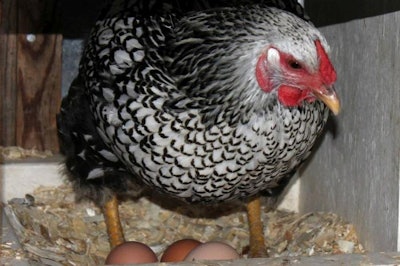

Jesse Laflamme
My family’s egg business was saved by going organic. We were rescued again when we joined forces with the Organic Trade Association to fight a regulation that threatened the continuation of our operation. Now the organic sector has a chance to band together for a common cause that could benefit the entire organic industry and better all of our futures.
An organic check-off research and promotion program has been proposed to the U.S. Department of Agriculture by Organic Trade Association. The proposal was made after more than three years of input from thousands of organic producers just like myself and from countless hours of research and studying of current check-off programs to find out what’s worked and what hasn’t.
What emerged is a check-off program, known as GRO Organic, which for the first time in the history of agriculture check-offs in the U.S. is a check-off designed specifically for the organic sector. A check-off paid for by organic producers and organic businesses, and run by those same organic stakeholders. A check-off representing and fighting for not just one specific commodity, but for the whole organic brand, and for all of us who work every day to produce the most healthy food in ways that do not harm the environment.
People don’t always understand that organic is the highest standard out there.
Over the years of interacting with consumers, we know first-hand how confused consumers are about organic in the broad sense. Is natural better, is GMO-free as good as organic? What makes food organic? To have a program from a high level that educates on the benefits of organic is critical; that farmers are not allowed to use toxic chemicals, that farmer aren’t allowed to use antibiotics, not allowed to use growth hormones, and more; those are very high level virtues of organic that are often unclear and not differentiated enough from other brands.
We also know first-hand how insufficient is the funding for organic research. Our family has been in the egg business since the 1880’s, but we haven’t always been organic, and it wasn’t easy to go organic. In many ways, we were on our own when we were making the transition – without any extensive information or a resource network to help guide us, and struggling with a real dearth of research on organic egg production. The need for more research to enable the organic sector to expand is urgent, and an organic check-off would address that need.
Check-off will help fund research, promote organic sector
It’s estimated an organic check-off could bring in $30 million annually to help fund research, technical assistance and promotion activities for the organic sector.
Just think what that money could accomplish for organic. At least 50 to 75 percent of that $30 million would be used specifically for research or for activities that work hand-in-hand with research, such as dissemination of research findings to those of us on the farms. Imagine organic technical specialists in every state working with transitioning and existing organic farmers. Imagine educational and promotional campaigns reaching millions of consumers, and explaining the benefits of organic. The possibilities are enormous.
GRO Organic check-off and trust
I know there is a great deal of skepticism around the country within agricultural circles about check-off programs. And for good reason.
The GRO Organic check-off is designed to prevent the possibility of our funds being misdirected for activities that don’t help our sector, or that might violate the rules governing check-offs. The board coordinating the check-off activities and making the decisions on how the money would be spent would be balanced and give fair representation to farmers and small producers.
I’m impressed at all the reforms built into this check-off to make it transparent and responsive and effective. This is a check-off that we can trust to be working in our best interests.
As people learn more about this check-off, the number of supporters is growing. Take a look on the Gro Organic site at the organic farmers like myself -- and ranchers, processors and others -- who have put their names out in favor of this opportunity.
We know at Pete and Gerry’s that we can’t do this alone. Our business has grown from our own family farm, to a network of over one hundred small family farms. Our mission as a business is to provide an opportunity for family-scale egg producers to thrive, and we would not support the GRO Organic check-off if we did not believe it will benefit all stakeholders in organic.
We are all working for a common cause at Pete and Gerry’s, and that’s how it is with this check-off. This check-off by necessity is going to be to so broad to promote the benefits of organic that is not a small versus big or us versus them. We are promoting organic, and we all share that, no matter what size our farm is or what size our company is. There are shared values and shared principles of organic. That is what the organic check-off will promote.
This guest commentary is written by Jesse Laflamme, co-owner and CEO of Pete and Gerry’s Organics.

















